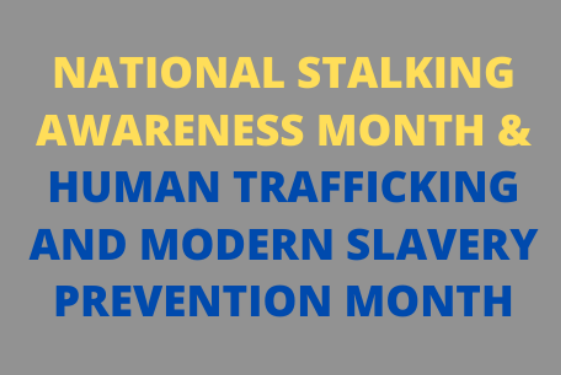
- Details
- By Native News Online Staff
LAME DEER, Mont. — January is as National Stalking Awareness, Human Trafficking and Modern Slavery Prevention Month.
In an effort to spread the word about this serious issue in Indian Country, the National Indigenous Women’s Resource Center (NIWRC), as a national Native-led nonprofit organization dedicated to ending violence against Native women and children, said on New Year’s Day, it strongly supports this designation.
NIWRC says American Indians, Alaska Natives, and Native Hawaiians experience some of the highest rates of sex trafficking and stalking in the United States.
Each year, thousands of victims of human trafficking are targeted and taken advantage of, where Indigenous people are at a higher risk of human trafficking, sex trafficking and labor trafficking than other populations. Indigenous groups in the U.S. - including American Indians, Alaska Natives, and Native Hawaiians - are especially at risk.1 American Indians and Alaska Natives are also disproportionately affected by stalking, where nearly half of Native women and one in 10 Native men have experienced stalking.
 A critical component of our work at NIWRC involves lifting up the voices of Tribal Nations and advocates in the call for safety, sovereignty and justice for victims of trafficking and stalking in their communities. We exist to provide support in raising awareness of these crimes alongside Native advocates as well as offer technical assistance and training, resources, and policy development specific to these issues. Our work will continue to center the experiences of Native victim-survivors of violence and support the sovereign rights of Indigenous Nations to increase safety for their citizens to prevent future acts of violence against Native women and children.
A critical component of our work at NIWRC involves lifting up the voices of Tribal Nations and advocates in the call for safety, sovereignty and justice for victims of trafficking and stalking in their communities. We exist to provide support in raising awareness of these crimes alongside Native advocates as well as offer technical assistance and training, resources, and policy development specific to these issues. Our work will continue to center the experiences of Native victim-survivors of violence and support the sovereign rights of Indigenous Nations to increase safety for their citizens to prevent future acts of violence against Native women and children.
We invite you to join the efforts in raising awareness of human trafficking on January 11th for National Human Trafficking Awareness Day by wearing blue clothing and posting it on social media with the hashtag #WearBlueDay. Please make sure to visit NIWRC’s social media pages throughout the month of January for resources on stalking and trafficking in support of Tribal Nations and programs supporting victims in our communities.
What is Stalking?
Stalking is a pattern of unwanted behaviors that violates your privacy, making you feel frightened, in danger or scared. Stalking behaviors can include being followed and watched, receiving repeated calls, texts, unwanted gifts, letters and emails, being tracked through GPS, monitoring your computer and phone calls, threatening you or loved ones, driving by anywhere you are, finding information about you through family, relatives, your garbage, and other behaviors that are intimidating and controlling. Stalking is often connected to domestic violence and sexual violence.
Stalking is unpredictable and dangerous because no two stalking situations are alike. There are no guarantees that what works for one person will work for another, yet there are steps you can take to increase your safety. Never approach your stalker or attempt to deal with it by yourself – get help immediately.
If you’re being stalked:
- Know that it’s not ever your fault.
- Trust your feelings. If you feel unsafe or scared, get help.
- Do not respond to the stalker’s communications.
- Take all threats seriously, especially if there’s talk of suicide or murder, or if you’re trying to leave or have ended a relationship.
- Document everything that happens with time and dates, save texts, record phone calls, keep unwanted “gifts,” etc. Call the police and ask for written reports of all incidents.
- Get a protection or restraining order.
- Contact a domestic violence program or other victim services program for support and assistance.
- Stay with family or friends or in a domestic violence shelter.
- Do not travel alone; change your routine and travel routes, if you can.
- Being stalked can cause fear, sleep problems or depression. Get support – it’s your right to ask for help.
What is Human Trafficking?
Human trafficking is a crime involving the use of force, fraud, or coercion to compel a person to perform some type of labor or commercial sex. Trafficking can happen in any community and anyone can be trafficked, regardless of age, race, gender, or nationality. Native populations experience disproportionately high rates given the history of government-sanctioned policies that resulted in being trafficked in boarding schools and by child welfare systems, churches, the military, and extractive industries. Traffickers might use violence, physical and psychological torture, manipulation, or false promises of well-paying jobs or romantic relationships to entrap victims into trafficking situations. Traffickers often target people in severe poverty.
Another type of human trafficking is sex trafficking, which involves the recruitment, harboring, transportation, provision, or obtaining of a person for the purpose of commercial sex, in which sexual acts are induced by force, fraud, or coercion, or in which the person induced to perform such act has not attained 18 years of age.
Victims of sex trafficking are often isolated, “invisible” to society, labeled as “throw away kids,” addicts, or targeted because they are already vulnerable. Traffickers can be part of a gang, organized crime syndicate, or family member/ relative, so-called friend or boyfriend.
Signs of human trafficking or sex trafficking:
- Fearful and mistrusting
- Cannot buy their own food or clothes
- Cannot come and go freely
- No contact with relatives or friends
- Malnourished
- Has scarring, cigarette burns, or tattoos/branding
- Signs of substance abuse or addiction
- Has traumatic brain injury, post-traumatic stress disorder, or is anxious or depressed
More Stories Like This
Johns Hopkins Collecting Tribal Success Stories from $1.5B Opioid SettlementArizona MMIP Task Force Holds Listening Session for Survivors and Families
‘A good stew is a story’ Blackfeet buffalo rancher shares Three Sisters Buffalo Stew recipe
National Indian Health Board Urges Congress to Extend Enhanced Premium Tax Credits
$1.25 Million Grant Gives Hope to Tolowa Dee-ni' Nation Amid Housing Crisis

